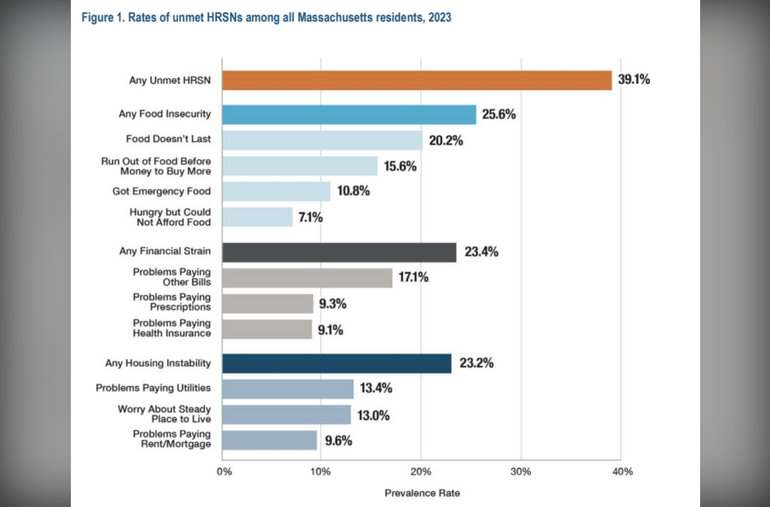Nearly 40% of Massachusetts residents dealt with at least one unmet health-related social need in 2023, with that rate disproportionately magnified among Black and Hispanic Bay Staters, according to a new report from state health officials.
The Center for Health Information and Analysis probed three types of unmet health-related social needs — food insecurity, housing instability and financial strain — based on data from the 2023 Massachusetts Health Insurance Survey. Those unmet needs can translate into decreased use of preventive care, which “may lead to higher acute care utilization, increased health care costs, and poorer health outcomes,” the report said.
The report found 27.7% of white residents had at least one unmet health-related social needs, compared to 61.5% of Black residents and 63.2% of Hispanic residents.
“The high rates of unmet HRSNs reported by Massachusetts residents and their families warrants the attention of policymakers and health care providers alike and can highlight opportunities for intervention,” according to the report, which was released on Thursday.
The report lands on heels of a new federal law that analysts say will slash access to insurance coverage and food assistance benefits to thousands of vulnerable residents. Massachusetts is also grappling with a housing crisis marked by soaring rent and home-buying costs fueled by an insufficient housing inventory.
The CHIA report found 25.6% of residents experienced food insecurity, with 20.2% voicing worries their food “doesn’t last long enough.” Broken down by race, 14.8% of white residents reported food insecurity, compared to 44.2% of Black residents and 45.8% of Hispanic residents.
Providing vulnerable residents with nutrition services can reduce emergency department visits and hospitalizations, CHIA said as it invoked a pilot program that connected MassHealth accountable care organization members with community resources.
The report found 23.4% of residents experienced financial strain, which can cause problems affording health insurance or prescriptions, plus paying other bills.
Some 23.2% of Bay Staters reported housing instability, with 13.4% having trouble paying utility bills and 13% worried about having a steady place to live. Housing instability affected 14% of white residents, compared to 44.4% of Black residents and 43.1% of Hispanic residents.
The report highlighted a state initiative which aims to “reduce racial, economic, and regional health disparities in the Commonwealth through targeted interventions.” The Advancing Health Equity in Massachusetts initiative focuses on perinatal/maternal health and cardiometabolic health and is active in 30 communities.
CHIA’s report was unable to account for geographic differences in unmet health-related social needs due to a small sample size.
“CHIA anticipates combining data from multiple survey years (e.g., 2023 and 2025) in future analyses to enhance our ability to detect differences by race/ethnicity within different geographic regions,” the report said. “Ideally, future research would also investigate how the availability of health care providers in rural settings, transportation challenges, employment stability, and other community-level social factors may contribute to HRSNs.”

